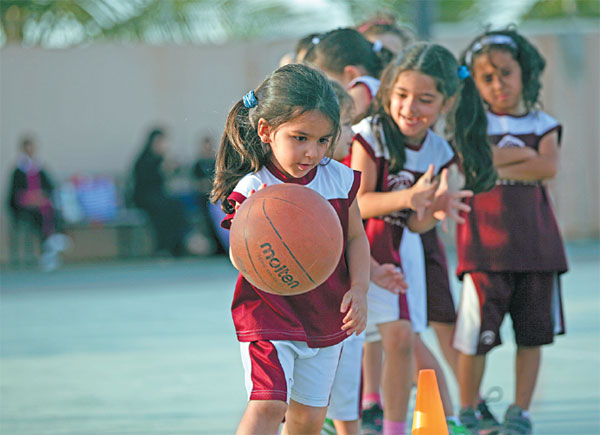Basketball more than a sport for women in Saudi Arabia
|
Saudi and expatriate girls practice basketball at a private sports club in Jiddah, Saudi Arabia. Women's basketball is gaining popularity in a kingdom famous for its public restrictions on female movement and activity. For the players, basketball is not merely a sport but an act of defiance in a country where female access to exercise is shunned by ultraconservatives. Hasan Jamali / Associated Press |
As the NBA season gets underway in the United States this week, a group of Saudi women and girls will be pursuing their own hoop dreams.
Women's basketball is gaining in popularity in a kingdom rife with public restrictions on female movement and activity. With the help of some US-trained coaches, female enthusiasts are using basketball to push for greater rights for women on and off the courts in Saudi Arabia.
"We are an activist team," said Lina Almaeena, who started the first women's basketball team here 11 years ago. That led to the creation of Jiddah United in 2006, the first sports club in Saudi Arabia to include women. "We took it upon ourselves to really promote the sport at a time when it was a big-time taboo ... when there was a self-imposed censorship on women's sports."
For the players, basketball is not merely a sport but an act of defiance in a country where female access to exercise is outright shunned by ultraconservatives and physical education is still not on the curriculum for girls in public schools.
Women are bound by strict rules when it comes to their attire, so they cannot be seen by men while jogging in sweatpants, much less wearing fitted or revealing shorts. Most women in Saudi Arabia cover their hair and face with a veil known as a niqab, and all women are required to wear a loose black dress known as an abaya in public.
Nevertheless, Saudi women's basketball is on the rise, and women from the kingdom are even playing in other Arab countries. Hadeer Sadagah, 20, started playing eight years ago with Almaeena at Jiddah United. She now plays at the collegiate level for the University of Sharjah in the United Arab Emirates.
"I wouldn't be the person I am today without the sport and the team," she said. "It made me be more active in society, school and studies. It made me more social. It made me confident."
At a recent afternoon basketball practice in Jiddah, girls as young as 4 jumped, shot and ran on open-air basketball courts behind gated concrete walls. Boys played in nearby courts. The children and their coaches stopped for daily prayers.
Almaeena said basketball is becoming popular among Saudi girls because it offers the camaraderie of a team sport. Basketball is also seen as acceptable in society since girls can practice in loose, conservative clothes, and the sport can be played indoors and outdoors.
From its humble beginning at Jiddah United, the sport has grown into a network of teams in different cities. No formal league exists but women's teams play in privately organized tournaments against a handful of other private schools, universities and club teams across the kingdom.
Despite the growth, women's basketball in Saudi Arabia still faces a host of logistical obstacles because of the kingdom's strict gender-segregation rules.
Women's teams are not part of the kingdom's federation that oversees sports, and women often struggle to find facilities to train. They are not allowed to attend matches in stadiums. In Jiddah, the older female players practice and play in a female-only gym. They only play tournaments in front of other women, and even their male coaches do not attend games.
It wasn't until 2012 that Saudi Arabia sent its first female athletes to the Olympics - two, to be exact. Two years later for the 2014 Asian Games, the kingdom reverted to its tradition of sending an all-male delegation.



















